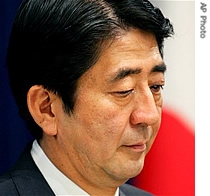-
(单词翻译:双击或拖选)
Hong Kong
12 September 2007
Japanese Prime Minister Shinzo Abe has announced his resignation after a year of missteps and scandals. The resignation is apparently1 an effort to prevent cancellation2 of Japan's non-combat role in Afghanistan. VOA's Naomi Martig reports from our Asia News Center in Hong Kong.
After a very troubled year that saw Japan's ruling party embroiled3 in allegations of financial wrongdoings and scandals, Prime Minister Shinzo Abe has decided4 to call it quits.
 |
| Japanese Prime Minister Shinzo Abe announces his resignation at a nationally televised press conference in Tokyo, 12 Sep 2007 |
Last week, Mr. Abe said he would resign if lawmakers did not extend a Japanese naval5 mission in support of U.S.-led operations in Afghanistan. Japan's navy has been refueling coalition6 warships7 in the Indian Ocean since 2001.
The law enabling that mission is set to expire November 1, and the opposition8 Democratic Party, which won control of the upper house of parliament in July, opposes an extension.
The naval mission has been a priority for Mr. Abe since he came into office last September, along with boosting Japan's global influence and revising the country's pacifist constitution.
Jeff Kingston is director of Asian studies at Temple University in Japan. Kingston says Mr. Abe's colleagues in the Liberal Democratic Party realized that the opposition's repeated calls for him to step down could make extending the naval mission very difficult.
"So I think that the party elders realized, well, if there is any chance of reviving this legislation in some form or another, and to strike a deal with the opposition on extending this legislation, that Abe had to go," Kingston said.
Yoshinori Suematsu, a member of the Democratic Party in Japan's lower house, says Mr. Abe's announcement was irresponsible, because just weeks ago he had refused to consider resigning.
"Every member of the diet was really surprised by the sudden news," said Suematsu. "We are very much embarrassed by no clear reason stated by Prime Minister, Mr. Abe."
Mr. Abe and the party received high popularity ratings at the beginning of the year. But the ratings have plummeted9 following a series of scandals.
First, the government admitted it had mishandled thousands of pension records. Four cabinet ministers have since resigned following accusations10 of financial wrongdoing, and a fifth committed suicide just before being questioned in yet another financial scandal.
Mr. Abe says he has instructed party leaders to search immediately for a new prime minister. Japanese media are reporting that a new election will be held on September 19th, and Taro11 Aso, secretary-general of the LDP, is considered a leading contender.
Mr. Abe is the youngest Japanese leader in modern times and the first to be born after World War II. He was praised for his efforts to improve ties with China and South Korea, which were badly damaged during his predecessor's term.
 收听单词发音
收听单词发音
1
apparently

|
|
| adv.显然地;表面上,似乎 | |
参考例句: |
|
|
|
2
cancellation

|
|
| n.删除,取消 | |
参考例句: |
|
|
|
3
embroiled

|
|
| adj.卷入的;纠缠不清的 | |
参考例句: |
|
|
|
4
decided

|
|
| adj.决定了的,坚决的;明显的,明确的 | |
参考例句: |
|
|
|
5
naval

|
|
| adj.海军的,军舰的,船的 | |
参考例句: |
|
|
|
6
coalition

|
|
| n.结合体,同盟,结合,联合 | |
参考例句: |
|
|
|
7
warships

|
|
| 军舰,战舰( warship的名词复数 ); 舰只 | |
参考例句: |
|
|
|
8
opposition

|
|
| n.反对,敌对 | |
参考例句: |
|
|
|
9
plummeted

|
|
| v.垂直落下,骤然跌落( plummet的过去式和过去分词 ) | |
参考例句: |
|
|
|
10
accusations

|
|
| n.指责( accusation的名词复数 );指控;控告;(被告发、控告的)罪名 | |
参考例句: |
|
|
|
11
taro

|
|
| n.芋,芋头 | |
参考例句: |
|
|
|















